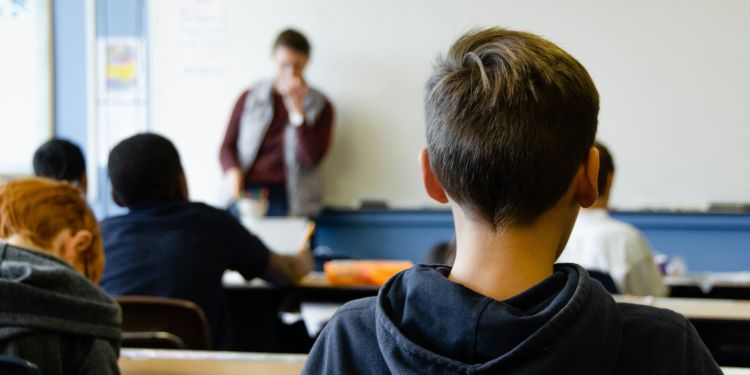Researchers support primary teachers in LGBT+ inclusive education

Professor Robert Vanderbeck’s research helps teachers to grow their confidence in providing LGBT+ inclusive education, which is essential for the equality and safety of pupils.
A report that Professor Vanderbeck (School of Geography) published alongside Dr Joe Hall (University of Hertfordshire) and equality and diversity consultant Mark Jennett found that “many schools are still struggling to fulfil their duty to offer LGBT+ inclusive education and support LGBT+ pupils and families”.
This is despite Relationships Education (RE), including LGBT+ awareness and inclusion, becoming statutory in September 2021.
LGBT+ inclusive education supports all pupils and families
LGBT+ inclusive education, either in RE or throughout the curriculum, supports the acceptance and respect of all individuals and families.
For children who have LGBT+ parents or family members, or are LGBT+ themselves, this taught acceptance is vital.
The report says that schools should ensure that "the needs of all pupils are appropriately met" and that "all pupils understand the importance of equality and respect."
The RE education includes understanding the diversity of family types, such as families with LGBT parents and the nature of marriage, including same-sex marriage.
However, the report, entitled “It’s only made us more determined” ‒ LGBT+ inclusive primary education in England and Wales: overcoming objections and developing effective practice (PDF)”, found that a variety of factors inhibit some schools from discussing LGBT+ people in primary RE.
These inhibitions are made worse by ambiguities in the RE guidance, such as the age at which LGBT content should be introduced to pupils and how the inclusion of LGBT content should be influenced by the religious background of pupils or the faith ethos of the schools.
Working with teaching staff
Before creating the report, the researchers surveyed 630 LGBT+ teaching staff in the National Education Union (NEU) and conducted individual interviews about the staff’s experiences of LGBT+ inclusive provision in primary schools.
Many suggested it was below the required standard due to factors like a lack of confidence to teach LGBT+ lessons and some organised opposition to LGBT+ inclusive education by some (primarily religious) groups.
The survey included questions about how their school’s confidence to provide LGBT+ inclusive education was impacted by protest movements such as the high-profile protests outside some Birmingham schools in 2019/2020. While some participants said protests had negatively affected their confidence to deliver an inclusive curriculum, others had increased their commitment to RE in response, leading to a “worrying, polarising effect.”
Professor Vanderbeck said, “A key finding is that strong leadership from head teachers and senior leadership teams makes a big difference to how confident teachers feel in delivering an inclusive curriculum.
“A number of teachers felt that their school’s leadership was unwilling to stand up to unreasonable parental demands and hence they are hesitant to introduce subjects such as diverse families.”
Overcoming opposition to inclusive education
To counter the challenges some schools face around the teaching of LGBT+ inclusion and overcoming opposition to the RE guidance, the report suggests a range of approaches.
These include the following tips:
- Establish trust and encourage dialogue with pupils and parents.
- Embed RE across the curriculum with age-appropriate content. Use stories that include same-sex couples and gender diverse characters to ‘usualise’ their existence.
- Take an intersectional approach – include diverse inspirational LGBT+ figures to challenge stereotypes about LGBT+ identities being White, ‘Western’ or middle class.
- Support all staff to ensure that the school’s approach is consistent.
- Avoid presenting LGBT+ inclusive education as ‘challenging’ or ‘sensitive’. Don’t only frame LGBT+ identities within the context of bullying or discrimination. Instead, focus on kindness, acceptance and equality.
- Challenge misconceptions while avoiding arguments about beliefs. If necessary, remind people that same-sex relationships, equal marriage and gender reassignment are protected by law.
To build on the published report, the researchers are now working with teachers in a selection of primary schools who would like to make their curriculum more LGBT+ inclusive.
Dr Hall, Lecturer in Social & Cultural Geography, says, “It’s worrying that many primary schools don’t feel confident to deliver on the Relationships Education (RE) guidance.
“Through writing our report, we have come to appreciate the challenges, barriers and constraints involved in delivering LGBT+ inclusive education, but have also tried to understand how these have been overcome.
“Our report seeks to capture the widespread good practice that exists and share how many primary schools have moved forward in ways that feel safe and effective for all.
“The research shows the importance of developing a foundation of trust between schools and parents. It's not a one-size-fits-all approach.”




